The Origins of Postal Chess in Venezuela (Part 1 )
(from the book "History of Chess in Venezuela" by Nicola Nigro Monasterios and César Reyes Maldonado, Ediciones Lázaro Darromán Cotilla 2010)
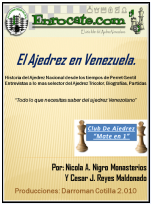 Correspondence chess matches: The start of the 20th century made correspondence chess matches popular in Venezuela, prompting emotions among fans and researchers who would follow press coverage and discussions in social centers. After the famous correspondence chess match between Perret Gentil and Ulder, a 3-game match was organized between Caracas and La Guaira, played by telephone between the months of June and August of 1906, featuring Pittaluga and Ruiz for the capital city team and Rivero Escudero and Perret Gentil representing the Litoral.
Correspondence chess matches: The start of the 20th century made correspondence chess matches popular in Venezuela, prompting emotions among fans and researchers who would follow press coverage and discussions in social centers. After the famous correspondence chess match between Perret Gentil and Ulder, a 3-game match was organized between Caracas and La Guaira, played by telephone between the months of June and August of 1906, featuring Pittaluga and Ruiz for the capital city team and Rivero Escudero and Perret Gentil representing the Litoral.
By the end of 1909 an apoteotic chess spring produced the Telegraph match between La Guardia and Valencia; in other words between the teams composed by Perret G., Splieth Y.J. Castro versus Carvallo, Prospero Rey, Venancio Muñoz and M. Carvallo Morlor.
With the start of 1911, and conmemorating 100 years of the venezuelan emancipation, an international match between Colombia and Venezuela was organized. Three games played via telegraph were agreed upon.The event was an initiative of the Bogota Chess Society whom invited The Caracas Chess Center. The colombian team included Eustorgio Arrieta, Antonio J. Caro, Guillermo Carroza and Joaquin Restrepo Tamayo. The venezuelan team was composed by Martin Ayala, R. Ruiz, Pittaluga, S. Soublette y Antonio Toro.
They played for a very valuable golden Cup as well as other prizes offered by the Colombian Government. Bets were also placed by both parties. The games were followed closely by Caissa followers in giant boards placed in public meeting places. At the same time, the press in Cuba, Argentina, Ecuador, Trinidad, Curazao, England and USA commented on the match and followed the moves in detail.
After the first game ended with a victory for the native team, the newspaper "El Universal" published: "Tough and hard-played game, showing the inventive, knowledgable and elegant way of play of the champions from Caracas."
Caracas - Bogotá [C80]
Match via telegraph (R–1), 1911
[Team Caracas: Martín Ayala, Rafael Ruíz, Rafael Pittaluga, Simón Soublette and Antonio Toro Key] 1.e4 e5 [Team Bogotá: Eustorgio Arrieta, Antonio José Caro, Manuel José Caro, Guillermo Carrozosa and Joaquín Restrepo Tamayo] 2.Nf3 Nc6 3.Bb5 a6 4.Ba4 Nf6 5.0–0 Nxe4 6.Re1 Nc5 7.Bxc6 dxc6 8.Nxe5 Be7 9.d4 Ne6 10.Be3 0–0 11.Nc3 Bd6 12.f4 g6 13.Ne4 Ng7 14.c3 Bf5 15.Nf2 Be6 16.g4 f6 17.Nf3 Qd7 18.h3 b5 19.b3 a5 20.Qd3 a4 21.c4 Re8 22.d5 cxd5 23.c5 Bf8 24.Qc3 axb3 25.axb3 Rxa1 26.Qxa1 Qf7 27.Qa6 b4 28.Qb5 Bc8 29.Qxb4 h5 30.Kh2 g5 31.f5 hxg4 32.hxg4 c6 33.Kg2 Bxf5 34.gxf5 Nxf5 35.Bd2 Rxe1 36.Nxe1 d4 37.Ne4 Qd5 38.Qc4 Qxc4 39.bxc4 Kf7 40.Kf3 Be7 41.Nc2 Bd8 42.Ng3 Nxg3 43.Kxg3 d3 44.Ne1 Ke6 45.Nxd3 Kf5 46.Nf2 Bc7+ 47.Kf3 Be5 48.Ng4 Bd4 49.Ne3+ Ke5 50.Nc2 Bxc5 51.Bc3+ Ke6 52.Nd4+ Kd7 53.Ke4 Bxd4 54.Bxd4 Ke6 55.Bb6 f5+ 56.Kd4 f4 57.Ke4 Kf6 58.Bd8+ Kg6 59.Be7 Kh5 60.Kf3 [Source: RAMOS, César; "El Ajedrez en Venezuela: 100 años de batallas sobre el tablero"; tesis de grado de la Universidad Central de Venezuela; Caracas, Abril 1986] 60...Kh4 61.Bf6 c5 62.Be5 g4+ 63.Kxf4 g3 64.Bd6 g2 65.Bxc5 Kh3 66.Bg1 Kh4 67.c5 Kh3 68. c6 Kh4 1–0
Bogotá - Caracas [D53]
Match via telegraph (2), 1911
1.d4 d5 2.Nf3 Nf6 3.c4 e6 4.Bg5 Be7 5.Nc3 Nbd7 6.e3 a6 7.Rac1 dxc4 8.Bxc4 b5 9.Bd3 Bb7 10.Qe2 c5 11.0–0 c4 12.Bb1 h6 13.Bxf6 gxf6 14.e4 Qc7 15.d5 Qf4 16.dxe6 fxe6 17.a4 b4 18.Na2 Qg4 19.h3 Qh5 20.Qxc4 Nc5 21.Nh2 a5 22.Qb5+ Kf7 23.Rxc5 Qxc5 24.Qxb7 Rb8 25.Qd7 Rbd8 26.Qb5 Qxb5 27.axb5 Rd2 28.b3 Rb2 29.Ng4 Bc5 30.Nxh6+ Ke7 31.e5 f5 32.g4 Rh8 33.g5 Rd8 34.Kg2 Rd2 35.Bxf5 Rxf2+ 36.Rxf2 Rxf2+ 37.Kg3 exf5 38.Nxb4 axb4 39.Ng8+ Ke6 40.Nf6 Rb2 41.g6 Rxb3+ [Team Bogota un telegraphed on December 4 1911:"We resign this game and the match" / SOURCE: Diario El Universal; Deportes varios; Págs. 7 u 8; Caracas, del 18 de Junio al 6 de Diciembre de 1911. 0–1
A second match Bogota-Caracas was played between August 1930 and March 1931, resulting in a tie.
A team from San Juan de Puerto Rico faced another one from La Guaira via telegraph between 1934-1935, with the victory of the La Guaira natives.
The first match via Radio took place from September 16, 1934 and June 1935 between the Barranquilla Chess Club and the Chess Center in Maracaibo, ending in one win and one draw for each team.
The Origins of Postal Chess in Venezuela (Part 2 )
(Rafael Santana B. and Cesar Reyes Maldonado)
1951 Venezuela amongst the first few ICCF members
Postal Chess started to become strong in Latin America due to the efforts of argentinian players who in the 1940's started to promote the creation of National Leagues, from the south to the north of continental America. In 1951, year when ICCF was created, Venezuela was one of the 21 american members along with Argentina, Barbados, Bolivia, Brasil, Canada, Chile, Colombia, Cuba, Ecuador, El Salvador, United States, Guatemala, Guyana, Mexico, Panama, Paraguay, Peru, Puerto Rico, Trinidad and Uruguay.
Source: Revista Digital LADAC 264, year 2007
Pablo Atars and the Latvian Gambit
The first venezuelan name in the international postal chess scene was that of Pablo Atars (1904-1976), renouned Latvian Gambit player who was not only a player but also a chess journalist, officer and organizer in Venezuela. Between 1961-1967 became a colaborator for the prestigious american chess magazine "Sacha Pasaule-Chess World", publishing a series of articles about the Latvian Gambit. In addition, he organized Latvian Gambit thematic correspondence chess events such as the one played in 1967 where another player from Venezuela participated, Neptalí Morillo Párraga.
Final standings: 1st. J.S. Morgado (ARG) 20/22, 2nd. N.R. Eckenfels (ARG) 19, 3rd. G. Toro Solís (CHI) 14.5, 4th. A.L Saavedra (ARG) 13.5, 5th. F. Acosta (CUB) 12.5, 6th. N. Morillo (VEN) 12, 7th. P. Atars (VEN) 10, 8th. V.H. Ortiz (ARG) 9, 9th. C. Torres (ARG) 8, 10th. L. Alberts (ARG) 6.5, 11th. C.H. Alvarez (ARG) 4, 12th. Olmedo (ARG) 3.
Game: N.Morillo (Ven)-J.S.Morgado (Arg) Thematic International Tournament of the Latvian
Gambit G-7/67 (1967-70) 1. e4 e5 2. Nf3 f5 3. Bc4 Nf6 4. Nxe5 Qe7 5. d4 Nc6 6. O-O fxe4 7.Bf7+ Kd8 8. Nxc6+ bxc6 9. Bb3 d5 10. Ba4 Bg4 11. Qe1 Qe6 12. Qc3 Kd7 13. Bf4 Rb8 14. Qa5 Bd6 15. Bxd6 Qxd6 16. Bb3 Be2 17. Re1 Ng4 18. g3 Nxh2 19. Nd2 Nf3+ 20. Nxf3 Bxf3 21. Re3 Qh6 22. Rxf3 exf3 23. Qc3 Rhf8 24. Qd3 Qh3 25. Qf1 Qxf1+ 26. Kxf1 Rbe8 27. Ba4 Rf5 28. Rd1 Rh5 29. Kg1 Re6 0-1
Pablo Atars organized the Correspondence Chess event "Betins Memorial" (Karl Betins is recognized as the creator of the Latvian Gambit). 800 players from different countries participated producing many important theoretical progress with the development of new variations such as the Strautins Variation (3. Bc4 b5!?), Morgado variation (3.Bc4 Nf6!?), Budovskis variation (7.d3! in the 4.Nc4 line) and others. After Atars' passing in 1976 the american Ojars Leonhards Purins conitnued to organize the "Betins Memorial" and also the "Atars Memorial" from 1976 to 1980.
Source: A condensed history of the Latvian Gambit, by Franz Destrebecq
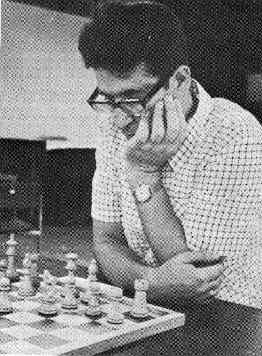 1965-1967 Venezuelan Celso Sánchez Pouso wins the First CADAP Latin American Zonal Final (ICCF Zone 2)
1965-1967 Venezuelan Celso Sánchez Pouso wins the First CADAP Latin American Zonal Final (ICCF Zone 2)
The first Postal Chess Latin American Zonal Final was organized by CADAP in 1965/1967 and won by venezuelan Celso Sánchez Pouso, tied in points with argentinian Víctor Héctor Ortiz. Tiebreak was defined by the S.B. system since both players obtained 17 points in 19 games!. CADAP granted the title of Latin American Postal Master (MLP) to Celso Sánchez Pouso and MLP norms to the following venezuelan players: Pablo Atars (5th place in Zonal I played in 1967) and Neptalí Morillo Párraga (4th place and 76% of possible points in Zonal I in 1967).
Source: Revista Ajedrez Postal Americano APA / # 164 / October 2002
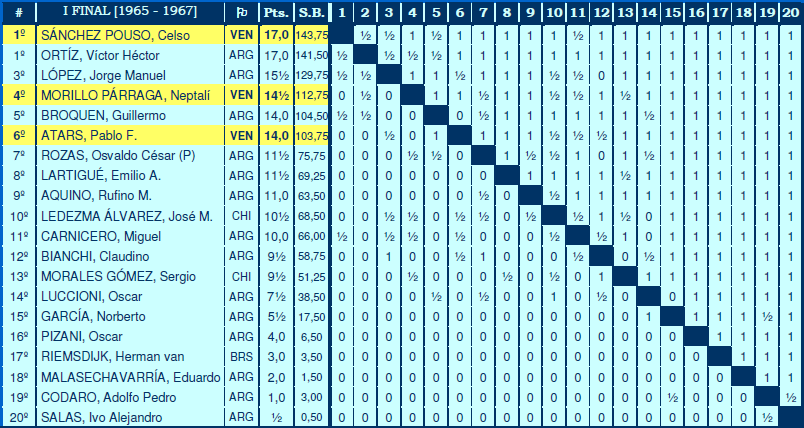
1966 Venezuela, CADAP founding and staff member until 1976
The 1966 ICCF Congress in Rome authorized CADAP (Confederación Americana de Ajedrez Postal) to organize tournaments in Latin America. At the same time, the following countries became ICCF members via CADAP: Bolivia (LIBAP), Brasil (CXEB), Chile (LICHAP), Colombia (LICOAP), Ecuador (LIECAP), Honduras (LIHOAP), Mexico (AMAP), and Uruguay (TU). These countries joined those already recognized as members: Argentina (1946), Perú (1965) and Venezuela (1966). However, CADAP established itself as founded on April 14th (Day of the Americas) 1967 with the following list of founding Leagues:
-
Liga Argentina de Ajedrez por Correspondencia LADAC
-
Clube de Xadrez Epistolar Brasileiro CXEB
-
Liga Venezolana de Ajedrez Postal LIVEAP
-
Liga Chilena de Ajedrez Postal LICHAP
-
Teleajedrez Uruguayo TU
-
Liga Boliviana de Ajedrez Postal LIBAP
Eventually, the venezuelan Neptalí Morillo Párraga became President of CADAP (ICCF Zone 2) between 1969-1976, and Pablo Atars took part in the VicePresidents Commitee during the same time period.
Source: Revista Digital LADAC 234 (15 Apr 2007)
The Origins of Postal Chess in Venezuela (Part 3 )
(Rafael Santana B. and César Reyes M.)
1970 Epifanio Gómez, First Postal Chess National Champion
In 1970, the Venezuelan Postal Chess League had the following officers: Gabino Yejo Vásquez (President), Luis Valdespino (General Secretary), Pablo Atars (Tournament Director), Luis O. Aristimuño (Board Member) and Neptalí Morillo Párraga (Consultant). The postal address was Calle Real de El Guarataro, Edificio "Ala", apartment 7, San Juan, Caracas, 102. This Board issued the following announcement: "After qualification, we have designated as venezuelan representatives in the II American Individual Postal Chess Championship the following players, Epifanio Gómez Salazar, Postal Chess National Champion, and Celso Sánchez, who took second place."
Source: Revista Mundial de Ajedrez (Noviembre-Diciembre 1970, pagina 17) Eduardo Ortega (Editor, Director) Caracas VEN
According to the Revista de Ajedrez de Venezuela (1966), "Postal chess in Venezuela started in 1965 under the leadership of Dr. Neptalí Morillo Párraga who was able to create 8 internal groups that same year. A match against Argentina on 10 boards and another one against East Germany on 5 boards." The First National Postal Chess Championship had been completed in 1966 with the gradual formation of new groups to reach a total of eleven, mixing foreigners and locals, 7 players per group.. The Champion Epifanio Gómez (from the "El Espinal") had been part of group 10 along with Dr. Rolf Spiess (East Germany), Armando Pérez P. (Caracas), Dr. Castillo Muller (Boconó), Jorge Guerra (Maiquetía), José Luis Toro (Caracas) and Prof. Arteaga (Valencia), with Armando Pérez P. as group coordinator.
Source: Revista Ajedrez en Venezuela (Febrero-Marzo 1966 #3-4, page 8.). Publication sponsored by FVA, Caracas, Venezuela.
1973 Venezuela takes Sixth place in First American Postal Chess Olympiad
The spaniard chess magazine "Jaque" reported in 1974 the final standings of the 1st. American Postal Chess Olympiad: 1. Cuba (47.5), 2. Bolivia (37.5), 3. Chile (37.5), 4. Argentina (37), 5. Uruguay (35.5), 6. Venezuela (29.0), 7. Colombia (18.5), 8. Honduras (14.0) and 9. Mexico (7.5).
Source: Jaque January 1st. 1974, Year 4, Number 25, Page 38. Editor and Director José María González, San Sebastián, España.
The venezuelan Celso Estanislao Sánchez Pouso was born in 1929 in Puebla de Caraminal (La Coruña, España) and moved to Venezuela in 1955, particpating in the 2nd. Final of the American Zonal Postal Chess Championship

In 1977 he qualified to the IX Final of the World Correspondence Chess Championship in ICCF, event that lasted 6 years. He took 6th place amongst the top 17 players in the World.
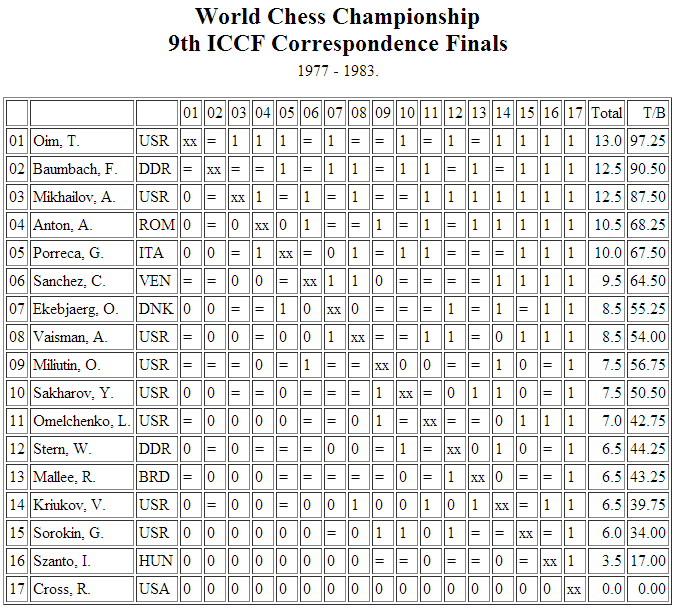
Celso Sánchez played at the same time the 4th Final of the Zone 2 Postal Chess Championship:
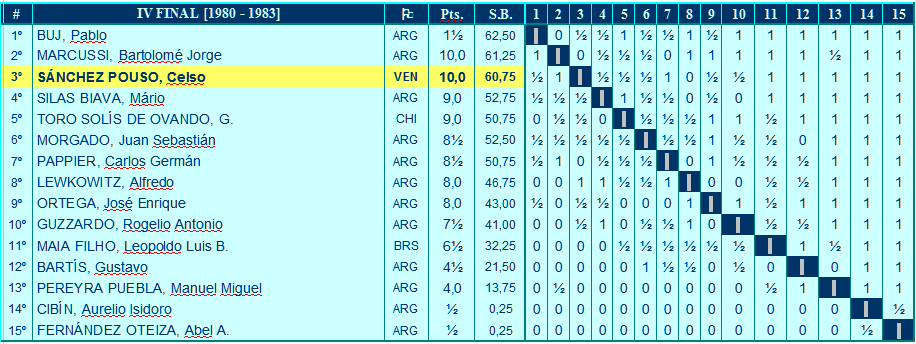
With these achievements, Celso Estanislao Sánchez Pouso advanced from Latin American Postal Master to International Master in 1980, title issued by ICCF. FIDE also gave him the FIDE Master title:
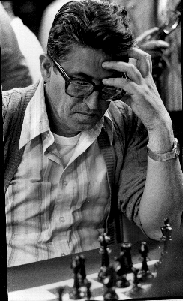
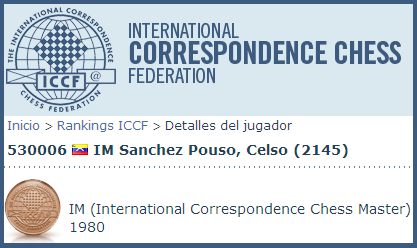
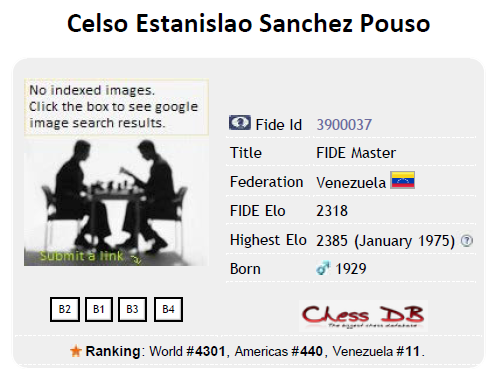
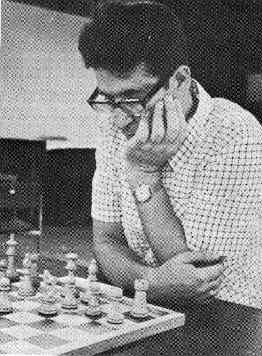
Here is a correspondence chess game played in 1948 between Celso Sánchez with the white pieces and Ricardo Grasa, with the black pieces:
1.e4 e6 2.d4 d5 3.Nd2 c5 4.exd5 Qxd5 5.Ngf3 Nc6 6.Bc4 Qd8 7.0–0 Nxd4 8.Nb3 Nxf3+ 9.Qxf3 Qb6 10.Be3 Nf6 11.Rad1 Bd7 12.Qg3 0–0–0 13.f3 Qb4 14.Be2 Nd5 15.Bd2 Qa4 16.Ba5 Nf4 17.Kh1 b6 18.Ba6+ Kb8 19.Bc3 Kc7 20.Bd3 f6 21.Be4 e5 22.Rd2 g5 23.Rfd1 h5 24.Bxe5+ fxe5 25.Qxg5 h4 26.Qf6 Rh5 27.Na5 bxa5 28.Qa6 c4 29.Qxa7+ Kc8 30.a3 Qb5 31.Qa8+ Qb8 32.Qa6+ Kc7 33.Rxd7+ Rxd7 34.Qc6+ Kd8 35.Qxd7# 1–0
Source: transcribed from the Magazine "Jaque" (February 1960, number 2, page 5). Published in La Peña de Ajedrez "Alexandre Bóveda', in the Lar Gallego. Jose María González (coordinator), Caracas, Venezuela.